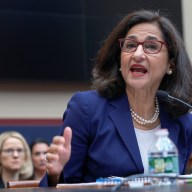The American Civil Liberties Union is considering representing the Ku Klux Klan after the notorious white nationalist organization was banned from participating in a Georgia adopt-a-highway program.
Since 1919, the ACLU has fought to protect Constitutional rights. The group is often cited for its crusades for free speech for student, as well as its efforts against the NYPD’s stop-and-frisk tactics, which the ACLU claims lead to racial profiling and unfair treatment of minorities.
Today, though, the ACLU is mulling over the decision to assist a local chapter of the KKK after the Georgia Department of Transportation said the white supremacist group could not proceed with plans to clean a stretch of Georgia State Route 515 in Union County.
Keith Golden, commissioner of the state Department of Transportation, told the chapter that the highway was not safe for clean-up crews, according to CNN. Golden also said KKK members cleaning the highway might pose as a distraction.
“The impact of erecting a sign naming an organization which has a long-rooted history of civil disturbance would cause a significant public concern,” Golden wrote. “Impacts include safety of the traveling public, potential social unrest, driver distraction or interference with the flow of traffic.”
ACLU officials are looking into whether or not the state of Georgia is violating the KKK’s freedom of speech. Debbie Seagraves, executive director for the ACLU of Georgia, said the state is supposed to provide an alternate highway to clean if the one requested by a group is too unsafe. Seagraves also argued that the state cannot deny the right of speech based on a potential negative reaction of others.
This wouldn’t be the first time the civil rights union defended a controversial and arguably unpopular cause — in 1978, the ACLU fought for a Nazi group’s right to organize a march through a Chicago neighborhood that was home to many Holocaust survivors.
“The decision to take the case was a demonstration of the ACLU’s commitment to the principle that constitutional rights must apply to even the most unpopular groups if they’re going to be preserved for everyone,” according to the ACLU’s website. “Many now consider this one of the ACLU’s finest hours.”
The ACLU also dedicates much of its resources to fighting for equality for “people of color, women, gay and transgender people, prisoners, immigrants and people with disabilities.”
















